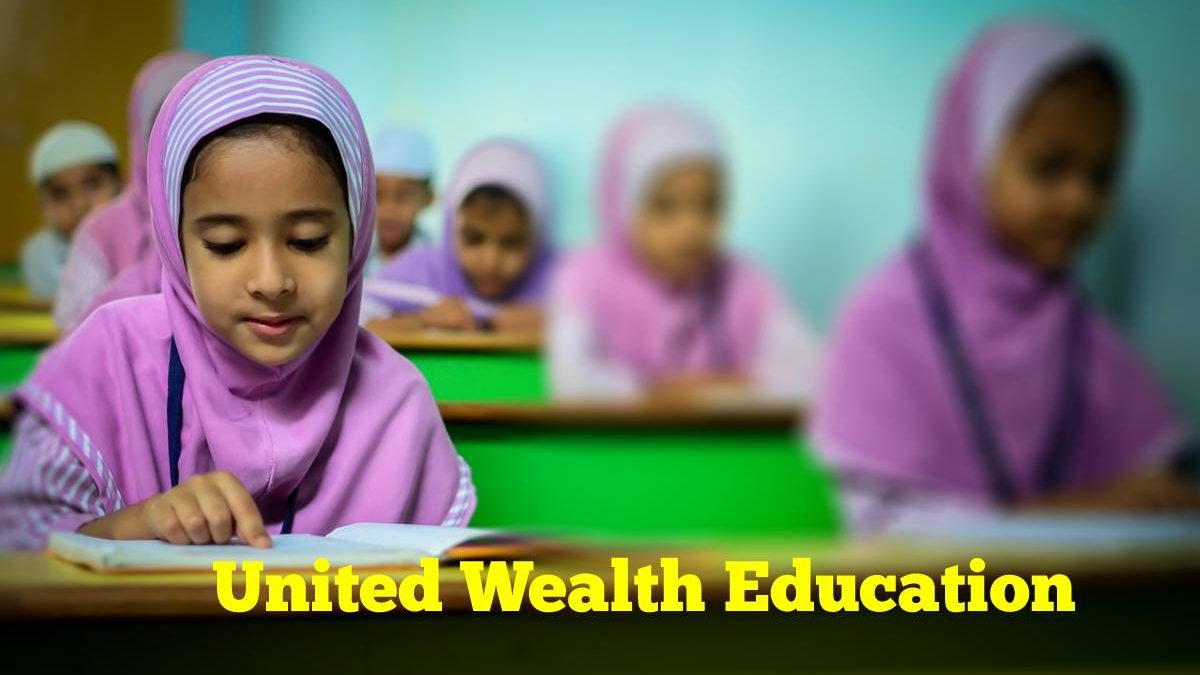Table of Contents
United Wealth Education
United Wealth Education: Education isn’t just about getting good grades. It is indeed a profitable investment for a country and a society. On the occasion of the release of the Education for All Global Monitoring Report, Unesco looks back on the economic and social gains linked to education.
Invest in education, notice in the education of children, pay extreme poverty in the search for significant advantages in terms of health and productivity, but also the democratic deployment and autonomy of women”, writes ‘UNESCO. “The data released today confirms even more clearly than in the past that education can positively transform lives and societies, United Wealth Education.

United Wealth Education empowers women
Girls and young women who have received an education are more likely to be aware of their rights and have the confidence to assert them. The frequency of early births would be reduced by 340,000 if all young women finished elementary school. According to Unesco, if all young women finished secondary school, the reduction would be two million.
Access to education for all children improves employment opportunities and increases economic growth: If all children, regardless of their background or circumstances, had equal access to United Wealth Education, the gains in productivity would stimulate economic growth. Over the next 40 years, per capita income would increase by 23% in countries where all children have access to education, estimates UNESCO.

United Wealth Education saves children’s lives
United Wealth Education helps women recognize early signs of disease, get advice and respond. If all women in developing countries completed primary school, child mortality would be reduced by one-sixth, saving the lives of nearly one million children a year.
But United Wealth Education also makes better citizens
United Wealth Education helps people understand democracy, promotes the tolerance and trust that underpins it, and inspires people to participate in the political life of their societies.
It now remains to convince donor countries
of these positive effects. The goal of universal primary education in 2015 will not be achieved. And the global crisis has reduced aid. Education does not necessarily make you more lucid.
United Wealth Education is a significant challenge for development.
At the start of 2015, the deadline for the Millennium Development Goals, many countries, mainly in sub-Saharan Africa, are still far from having generalized access to primary education. As a result, entire sections of the population remain excluded from the education system.
Even more worrying, the quality of education in some developing countries is too low to be able to hope to benefit from the benefits of education.
The post-2015 agenda must, therefore, clearly specify new achievable and clear objectives to continue to increase access to education and finally recognize the need to improve the quality of education systems.
The deadline for the Millennium Development Goals set for 2015 has come to an end; one thing is clear: there is still a long way to achieve the targets set in 2000, particularly in terms of education. In this article, we return to the evolution of access to education in developing countries while recalling why this issue is crucial. Then we will see how important it is also for the international community and national governments to recognize the need to invest not only in access to education but also in the quality of education.
The message of this article is twofold. First, not only is Universal Primary Education (UPE) far from being achieved despite the 2015 deadline, but it is also imperative to improve education systems in developing countries.

Access to United Wealth Education what are the issues
Since the theories of Human Capital (Becker, 1962; Schultz, 1961) and endogenous growth (Lucas, 1988; Romer, 1986), it is generally accepted that education, at the macroeconomic level, is an essential factor of economic growth. And a way to fight against all forms of poverty. Indeed, the more a population is educated, the more it is productive, which positively impacts economic growth (Graph 1). Moreover, education affects income and its distribution—the more educated the population, the more homogeneous the income (UNESCO, 2014). Therefore, increasing access to education is the first step toward reducing income inequalities within countries.
Wealth and Education
With the economy growing by more than 3% and after several years of prosperity, the Ombudsman has focused his 2017 annual report on inequality. “The social elevator has changed direction,” Francisco Fernández Marugán said in Congress on Monday to warn that the poor are increasingly closer to exclusion and the middle classes closer to poverty.
Indicators to measure poverty always arouse suspicion. But no one questions that the high unemployment rate that Spain continues to suffer from has installed us in an unfair and inefficient system in the distribution of wealth. The Gini coefficient, which measures income inequality, has not stopped increasing in recent years (see graph), even though countries, such as Germany, are worse off.
Professor Rafael Doménech maintains that since Spanish inequality is high, he is surprised that it is not increased with the high unemployment rate. And he attributes this fact to the fact that the welfare state has proven to be an effective spring against inequality. However, this welfare state shows signs of exhaustion. Perhaps the best reflection of this is the mobilization of pensioners; since today’s pensions are higher than tomorrow’s, 60% of pensioners do not exceed 800 euros per month.
Inequality in Spain has also crept into this week’s G-20 debate in Brazil, where the OECD has included better access to education among its prescriptions for bridging the gap. The problem is that the precariousness of the labor market is such that not even a suitable qualification is a guarantee of wealth in Spain. Unemployment is raging harshly among the young people of a very well-prepared generation.

United Wealth Education is an investment
From antiquity, Plato knew the importance of information and learning. A man who neglects to tutor “walks through life with a tottering step.”
But the first to have highlighted education as an investment are two Nobel Prize winners in economics: T. W. Schultz showed that investing in education promotes growth, and we owe Gary Becker the theory of capital human.
This theory posits the principle that investment in education allows a better return for an individual. Recent studies have supported this thesis and verified specific empirical estimates, as explained by James Heckman.
The study of neurogenesis teaches us that the ability to learn does not disappear over time. But on the other hand, the cost/benefit ratio is not the same depending on whether a person is young or old. Moreover, whatever the age, the investment is more profitable when it concerns workers who already have good skills. And these abilities develop primarily in the first years of an individual’s life (a).
The labor market demands new skills
This development is partly due to the race between technology and education. Which results from the adaptation of markets to the automation of production. In this new world. The competitiveness of workers suffers from the lack of efficiency of education systems in most developing countries. Technological change and global competition require many people to master certain skills and acquire new ones.
Countries can compete and thrive
To perform well in today’s labor market, you need to invest early and in the right skills (see box below). Above all, countries must invest wisely, focusing on promoting three essential elements(a): autonomy, accountability, and evaluation. In addition, it is necessary to pay attention to the teaching staff, the development of young children, and the culture.
Focus on results
Successful education systems prepare children from an early age, constantly evolve. And use the information they have to drive improvements and foster school accountability. Whether through evaluations where the stakes are high (penalties or rewards) or not, transparency and accountability pay off. Making schools and teachers answerable through tests is indeed a cost-effective method. Even if the cost of accountability were ten times higher. It would still only represent 1% of the public United Wealth Education budget. Explains Caroline Hoxby (a).
watch the video of United Wealth Education
Conclusion
At the beginning of 2015, it is clear that, despite some notable progress. Many children are still excluded from the education system. Which represents a powerful brake on development and confines these children to the poverty trap. It is imperative that developing countries not relax the efforts undertaken since 2000. And direct their policies toward children from underprivileged or rural backgrounds. And mainly girls. Nor should the goal of universal access to education overshadow. And equally important imperative for making education a weapon against poverty. Namely improving the quality of learning in schools. This notion of quality is all too often ignored when without it,
People also ask
Related searches
united wealth education pyramid scheme
united wealth education login
united wealth education back office
united wealth education lawsuit
united wealth education founder
united wealth education jobs
uwe united wealth education
united wealth education agents
united wealth education login
is united wealth education a pyramid scheme
united wealth education jobs
uwe united wealth education
united wealth education owner
united wealth education back office
united wealth education address
united wealth education phone number
Also Read: r/amcstock


Review What is United Wealth Education.